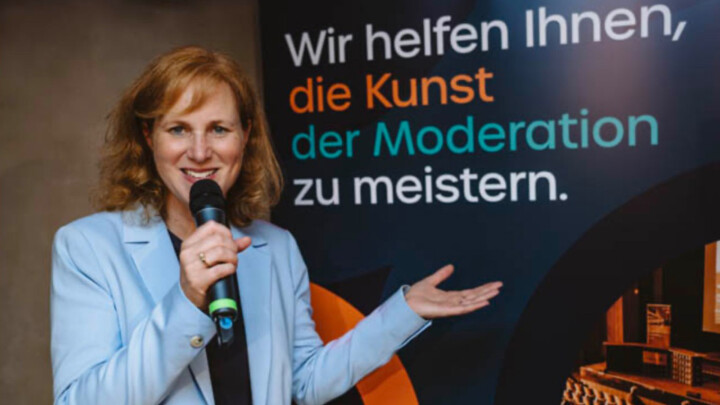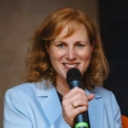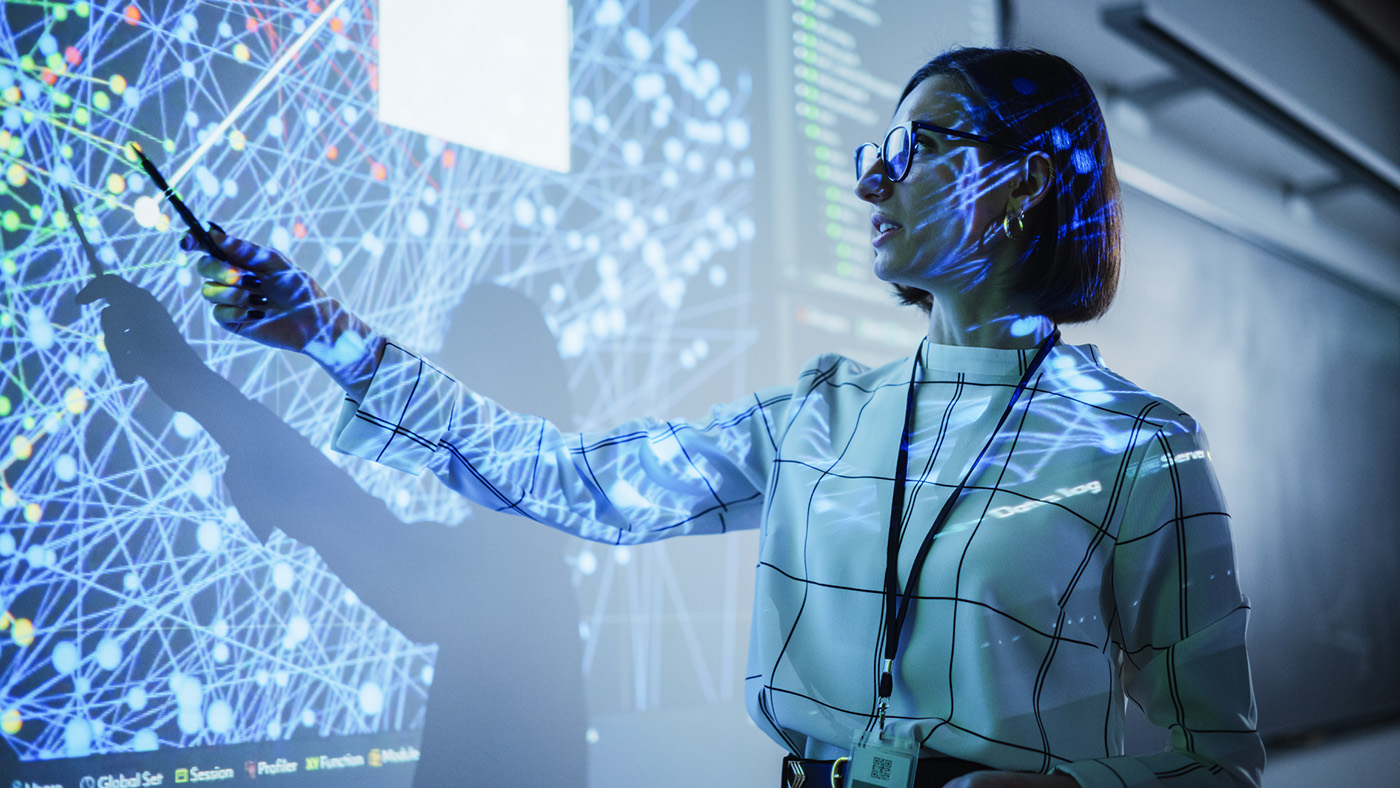Building Bridges, Taking the Stage: Empowering Women Through Communication
Kerstin Stromberg-Mallmann of Talking Bridges on empowering women through confident communication, powerful stage presence, and strong inner mentors.

@Kerstin Stromberg-Mallmann
Kerstin Stromberg-Mallmann is Head of the German Presenters’ Academy (“Deutsche Moderatorenakademie”) and CEO of Talking Bridges. In 2023, she founded the “Deutsche Moderatorenakademie” where she trains high-ranking experts for event-moderation with large audiences. Communication is her great passion, and her goal is to build bridges through language. In addition to her work as a professional presenter on major stages, she is a trainer and coach, training people who are eager to learn about professional live presentation.
Jill Kommoss: How would you describe your workday, and what is particularly exciting about your job?
Kerstin Stromberg-Mallmann: My work offers a lot of variety every day, that’s what makes it so special for me. In that sense, I don’t have a typical daily work routine. I love working with lots of different people. This allows me to immerse myself in different walks of life and learn something new every day. For example, on one day I might be hosting an exciting event, while on another day I might be preparing for a training session or coming up with helpful exercises for participants in our seminars. It’s simply very exciting and varied.
Jill: You worked for many years as a civil servant in federal ministries and are now self-employed with your own company and as a presenter. What are your three career tips for women who also want to become self-employed?
Kerstin: Becoming self-employed was a huge step for me because it meant giving up maximum security. I didn’t just do it on a whim – it was an inner process. That’s why my first tip is: take implementation step by step. I built up my self-employment alongside my job and was already presenting during my time at the ministry. That allowed the process to grow steadily, and I became increasingly confident in my desire to become self-employed.
My second tip is to find people who will support you on this journey, encourage you and give you strength. That means no doubters, no naysayers who nip your ideas in the bud – but rather people who see your potential and encourage you to pursue it.
And my last and most important tip: listen to your heart. Set up self-employment in a field you are passionate and enthusiastic about. Something that makes you feel like you are making a positive contribution to the world.
Jill: You are present at many events as a presenter and speaker. Are women still underrepresented on stage, or are you noticing changes?
Kerstin: It depends very much on the industry. When I’m presenting events in the education sector, it’s mostly women on stage. But when we talk about topics such as digitalization, artificial intelligence, infrastructure development, and economic policy, that’s still very male-dominated.
But I am also noticing changes. Many event organizers now actively want to see more women on stage and choose their panelists accordingly. There are male panelists who will only participate if a woman is also represented. I also notice that a young, self-confident generation is emerging that wants to position itself on stage. In that respect, change has already begun and is continuing steadily.
Jill: Based on your own extensive experience, what can help women to position themselves better on a male-dominated stage?
Kerstin: My most important tip is: good preparation! It gives us confidence and poise. This applies both to the content and to the how – meaning appearance and effect on stage. That means practice, practice, practice. Through this, you become aware of your own strengths. Receiving positive feedback is also crucial.
In my coaching sessions, I often notice that women tend to be more self-critical than men. Men believe they already meet many expectations, while women see more potential for further development. On the one hand, this is good because we want to improve. At the same time, we women should turn our inner critic into our inner mentor. This means that instead of focusing on what we cannot yet do, we should go on stage with confidence. We should believe in ourselves, see our strengths, and focus on all that we can do. That is what we then radiate outward.
Jill: Are there any tips that women can keep in mind when they are on stage? How can one react confidently in uncomfortable situations?
Kerstin: As already mentioned, it’s important to go on stage with an inner mentor and a sense of self-confidence. To tell yourself that you are making a valuable contribution and that you will perform well. Our body language is also crucial. That means upright stance, maintaining good posture, and facing the audience.
In an uncomfortable situation, my first tip is: exhale. Don’t take it personally and ask an open question or give feedback. This throws the ball back and mirrors the other person. The gold standard is to reveal and convey the other person’s emotions through active listening. For example: “I get the impression that you’re very upset. The topic seems to make you really angry,” or “You’re speaking very loudly, which I find uncomfortable. Is that what you intended?” This can help calm the other person down. That’s why my golden rule in life is to state things as they are and give feedback.
Jill: You briefly mentioned the role of the organizer. Are there specific measures that organizers can use to attract more women as presenters or speakers and position them better?
Kerstin: I firmly believe that there are enough great female experts who are ready to take the stage. In my view, this requires the willingness of event organizers not to look exclusively at the highest hierarchical level when searching for suitable female speakers. Does it always have to be the CEO – or can the division manager also appear as an expert?
Organizers can actively search for female speakers on platforms and should use their contacts. They need to adopt the right mindset and set it as a concrete goal to bring more women on stage. On-site, I see less responsibility lying with the organizer and more with the presenter. I have the impression that women tend to speak more briefly and take up less space. As a presenter, I therefore make a point of ensuring that all participants have a similar share of speaking time and adjust the number of questions accordingly.
Jill: At Talking Bridges, your goal is to build bridges through communication. To this end, you offer various coaching and training courses. What do these coaching sessions look like, and how can they help participants?
Kerstin: Our seminars and coaching sessions are highly interactive and include many practical exercises. All participants receive individual, appreciative feedback and plenty of space for their questions. A particular highlight is the virtual reality headset, which allows participants to speak in front of 10, 250, or even 500 people. This gives them a real sense of what the situation feels like. The integrated AI provides direct feedback on the speed and style of speech, as well as the use of filler words.
Consistently, all participants feel empowered by our seminars and are more confident in both conversation situations and on stage. Again and again, I hear that the quality of their relationships with other people has improved, primarily due to active listening. Our services help people become more aware of the different facets of communication. We aim to support individuals in better reflecting on themselves and their strengths and weaknesses. This enables us to identify potential for further development and work on ourselves.
We offer our formats for all genders and hierarchical levels. Our goal is for women and men to work together constructively and strengthen each other. Studies repeatedly show that mixed teams perform best.
Jill: You have designed the “Female Empowerment” seminar for women. How can it support women in their career paths?
Kerstin: In this seminar, we address the differences between male and female communication and consider what conclusions we can draw from them. It’s very much about presence and impact with practical exercises. The topic of inner attitude is very important. How do I deal with myself? How do I see myself compared to others? Am I rather submissive, do I devalue it, or do I enter conversations, and even life itself, with a “you’re OK, I’m OK” attitude?
We work with many real-life case studies because women continue to experience situations in which they are not taken seriously or are devalued. We want to provide them with a toolbox so that they can deal with these situations more confidently and with greater strength in the future.
The seminar helps them to exchange ideas and recognize that they are not alone in facing such challenges. Our goal is to transform the inner critic into a supporter. I’m convinced that when we develop a positive attitude and confident presence, this sovereignty is reflected back to us by others. We therefore need to make a change in perspective and transform negative and critical thinking. This is particularly important on stage and in professional situations in general.
Jill: Do you have three golden pieces of advice for positioning oneself more strongly in professional life?
Kerstin: To position yourself more strongly as a woman, I have three tips: First, you should empower each other, strengthen each other, and network with each other. This works very well through feedback. Second, see yourself as a creator and act proactively. And the third is visibility. Present yourself as an expert and presenter, and consciously take your space – in meetings and on stage.
Jill: Thank you very much for your time and for taking part in our interview series!
The interview was conducted by Jill Kommoss.
📚 Citation:
Stromberg‑Mallmann, Kerstin. (August 2025). Building Bridges, Taking the Stage: Empowering Women Through Communication. dotmagazine. https://www.dotmagazine.online/issues/new-work-and-diversity/empowering-women-through-communication
Kerstin Stromberg-Mallmann is CEO of Talking Bridges GmbH, a company specialized in hosting and moderating events and talks in German and English, as well as in giving seminars. Thanks to the various positions she has held in Federal Ministries, the graduate economist has become an acknowledged expert in various fields including broadband technology and digitization, professional skill-building, and transformation of the labor market. For over 15 years, Ms. Stromberg-Mallmann has developed concepts and hosted events on complex topics, such as panel discussions with high-ranking participants, fairs, expert conventions, workshops, and dialogue-based formats. Her main focus is on promoting the constructive and authentic exchange between people. Clients, attendees and participants in her events appreciate her professional, charming and lively style. Her refined sense for her audience and active listening skills even on stage are what set Ms. Stromberg-Mallmann apart.
In 2023 she founded the “Deutsche Moderatorenakademie” where she trains high-ranking experts for event-moderation with large audiences.
Jill Kommoss is a Project Manager in the area of member support. She is also responsible for the New Work Competence Group, which focuses on the close intertwining of work and digital technology. She also oversees the Ladies in Tech initiative, which promotes women in the digital sector.
FAQ
Why is it important to highlight women's roles in the data center industry?
Women continue to be underrepresented in tech, especially in infrastructure roles like those in data centers. Highlighting their contributions helps normalize diversity in traditionally male-dominated sectors and supports initiatives like #LiT (Ladies in Tech) promoted by eco – Association of the Internet Industry.
What challenges do women typically face in data center careers?
Women in data centers often face barriers such as gender stereotypes, lack of mentorship, and low visibility in leadership roles. Addressing these challenges involves fostering inclusive hiring, promoting STEM education, and creating career paths that are visible and accessible.
How is Equinix supporting women in tech and infrastructure?
According to Dorén Fischer of Equinix, the company supports diversity through internal networks, inclusive leadership programs, and visibility campaigns. These initiatives aim to promote equity in career progression and workplace culture.
How can companies attract more women to infrastructure-focused roles?
Companies can:
• Use inclusive language in job ads
• Promote female role models in engineering
• Support flexible work and mentoring programs
• Partner with diversity networks like eco’s #LiT initiative
Why do data center roles matter in the larger tech ecosystem?
Data centers are foundational to digital infrastructure, supporting everything from cloud services to AI applications. Ensuring diversity in this space helps build more resilient, innovative, and equitable digital ecosystems.
Are there specific initiatives supporting women in digital infrastructure in Germany?
Yes. eco’s #LiT – Ladies in Tech initiative actively supports women in the digital sector across Germany and beyond. It includes networking, mentorship, and content contributions such as the article by Dorén Fischer in dotmagazine.
What practical steps can individuals take to support women in tech?
Actions include:
• Amplifying women's voices on social media
• Joining mentorship programs
• Supporting policies that advance diversity
• Sharing articles and insights like those published by dotmagazine and eco members






